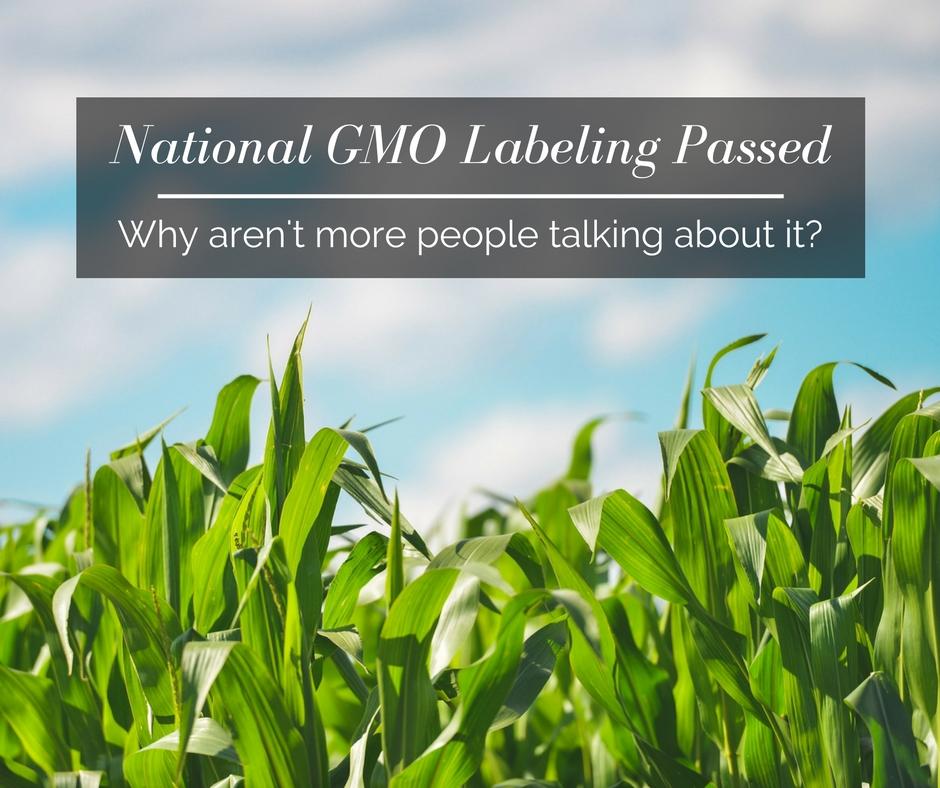GMO labeling is a well-known topic in the United States. According to a variety of < a href="http://www.justlabelit.org/right-to-know-center/polls-surveys/">polls and surveys, approximately 90 percent of Americans support mandatory GMO labeling. So on July 29th when President Obama signed a bill into law requiring the labeling of genetically modified ingredients in food, why weren’t more people celebrating?
While most media outlets covered the passing of the bill, the average American — including those in that 90 percent — doesn’t seem to know much about it. More than likely, this is due to the nature of the bill, and the controversy surrounding the public perception of GMOs.
The GMO Labeling Law That Almost Isn’t
As previously reported, the bill has extremely lax labeling requirements. Under the bill, food companies can choose how they disclose the use of genetically modified ingredients. They can decide between on-package labels or any of the following: QR codes (that can be scanned with smartphones), 1-800 numbers, or websites. As food companies attempt to appeal to a largely GMO-skeptical public, it’s safe to say that very few are likely to opt for the direct on-package label.
For this reason, GMO labeling advocates were disappointed with the bill, claiming that it’s hardly an improvement in transparency. As for food companies, the mandatory labeling — while not as bad as if on-package labels were required — was not something to celebrate either. Essentially, neither side was particularly thrilled nor enraged about the passing of this bill, which is likely part of the reason that it is not better known.
Americans Can’t Make Up Their Minds on GMOs
Despite the fact that estimates say 90 percent of Americans encourage labeling, in a study from Pew Research Center only about 50 percent of people believed GMOs were unsafe to eat. Although the labeling law passed, heated debate still continues over whether or not GMOs actually pose a threat to humans or the environment.
While companies like Chipotle and Whole Foods have taken actionable steps to remove or to label GMOs, they often receive criticism and are accused of pandering to false science. Although scientific evidence suggests GMOs are safe for consumption, there are numerous other concerns, including: herbicide and pesticide resistance, genetic erosion, monocultures, and multinational corporation control over the food supply.
Considering the conflicting viewpoints that are presented to the public, the issue has become one of much confusion. Being unsure exactly what to make of GMOs has likely resulted in some level of indifference from consumers, who can’t quite figure out if they should avoid GMOs or not. It’s possible that such indifference has resulted in less general interest, also contributing to the fact that the labeling bill is not better known.
Whether people are talking about it or not, the labeling regulations must be finalized by the USDA within two years, at which time companies will need to begin complying. In the meantime, the debate over the safety and sustainability of GMOs is sure to continue.
What do you think? Are you pleased with the labeling law? Do you think GMOs need to be labeled at all? Let us know!
While most media outlets covered the passing of the bill, the average American — including those in that 90 percent — doesn’t seem to know much about it. More than likely, this is due to the nature of the bill, and the controversy surrounding the public perception of GMOs.
The GMO Labeling Law That Almost Isn’t
As previously reported, the bill has extremely lax labeling requirements. Under the bill, food companies can choose how they disclose the use of genetically modified ingredients. They can decide between on-package labels or any of the following: QR codes (that can be scanned with smartphones), 1-800 numbers, or websites. As food companies attempt to appeal to a largely GMO-skeptical public, it’s safe to say that very few are likely to opt for the direct on-package label.
For this reason, GMO labeling advocates were disappointed with the bill, claiming that it’s hardly an improvement in transparency. As for food companies, the mandatory labeling — while not as bad as if on-package labels were required — was not something to celebrate either. Essentially, neither side was particularly thrilled nor enraged about the passing of this bill, which is likely part of the reason that it is not better known.
Americans Can’t Make Up Their Minds on GMOs
Despite the fact that estimates say 90 percent of Americans encourage labeling, in a study from Pew Research Center only about 50 percent of people believed GMOs were unsafe to eat. Although the labeling law passed, heated debate still continues over whether or not GMOs actually pose a threat to humans or the environment.
While companies like Chipotle and Whole Foods have taken actionable steps to remove or to label GMOs, they often receive criticism and are accused of pandering to false science. Although scientific evidence suggests GMOs are safe for consumption, there are numerous other concerns, including: herbicide and pesticide resistance, genetic erosion, monocultures, and multinational corporation control over the food supply.
Considering the conflicting viewpoints that are presented to the public, the issue has become one of much confusion. Being unsure exactly what to make of GMOs has likely resulted in some level of indifference from consumers, who can’t quite figure out if they should avoid GMOs or not. It’s possible that such indifference has resulted in less general interest, also contributing to the fact that the labeling bill is not better known.
Whether people are talking about it or not, the labeling regulations must be finalized by the USDA within two years, at which time companies will need to begin complying. In the meantime, the debate over the safety and sustainability of GMOs is sure to continue.
What do you think? Are you pleased with the labeling law? Do you think GMOs need to be labeled at all? Let us know!






